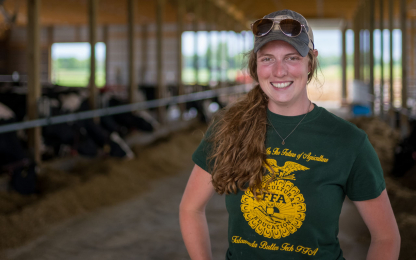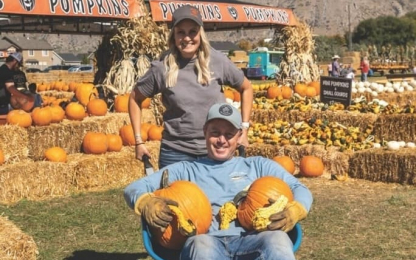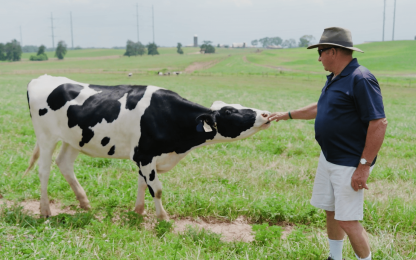Three Generations of Innovation
Austin Allred’s family has been farming in the heart of eastern Washington’s central desert since the early 1960s, when the Columbia Basin Project turned thousands of sagebrush acres into farmable ground. The Allreds have been building healthy, fertile soils in this area for three generations. It’s still the number one priority at Royal Family Farms, a diverse family business focused on innovation. Autonomously and together, Austin and his brothers, Derek and Tyson, grow potatoes, value-added cover crops and tree fruit, with Austin now managing dairy, beef cows and one of the world’s largest worm farms. Together they are pioneering regenerative farming practices at scale to reduce their reliance on inputs, build healthy soil, upcycle byproducts and reduce waste.
“We talk a lot about soil health, animal health and environmental health,” Austin said. “In nature, these symbiotic systems are all connected, and they build on each other. My dad, Jerry, is a longtime potato grower. For years we’ve used a system of rotating cover crops and no-till practices to build organic matter in the soil and sequester carbon. Then we’ve added cows in the farming ecosystem to upcycle the byproducts and things humans can’t digest to produce high-quality protein and nutrient-rich compost that goes back to our fields.”
From Farm to Fork
Today, Royal Ranch beef is available in restaurants and retail grocery stores in Portland, Oregon and Seattle, Washington. At the Climate Pledge Arena, home to the Seattle Kraken professional hockey team, consumers can use an app called FarmTracer, to scan a barcode at the point of purchase to see a complete history of the animal and the entire path of the product through the food chain.
“The consumer is really excited to learn more about where their food comes from now,” Austin said.
Feeding the Future
AgWest Farm Credit is committed to supporting farms like the Allreds’ that prioritize sustainable practices and climate care. Together, they are dedicated to producing high-quality products while preserving the environment for future generations.
“Our family’s commitment is to use regenerative ag practices at scale to care for our soils, our animals and our environment in the most transparent way possible,” said Austin. “We’re learning all the time. All farmers know there are no easy answers when you’re working within nature. It takes a lot of trial and error and you’re going to make some mistakes. But in the end, it’s so rewarding. We’re in this for a good cause: to feed a growing world.”
Originally published in AgWest’s summer magazine, “West Connect”


